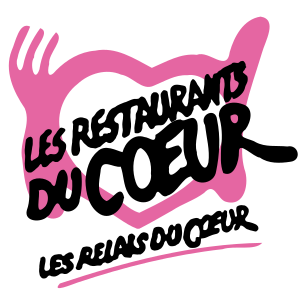Restaurants du Cœur facts for kids
Les Restaurants du Cœur, which means "Restaurants of the Heart" in English, is a famous French charity. It is often called Les Restos du Cœur. The charity was started by a French comedian named Coluche in 1985. Its main goal is to give free food packages and hot meals to people who need them.
The charity helps many different people, including those without homes, families with low incomes, and older people. Besides giving out food, the Restos du Cœur also helps people find a place to live and supports them in other ways. In France, the charity has a special status that means it doesn't have to pay certain taxes. By 2015, it had 66,000 volunteers. It is also famous for its yearly fundraising concert called Les Enfoirés.
Contents
The Story of the Restos du Cœur
The idea for the Restos du Cœur came from the comedian and actor Coluche. On September 26, 1985, he announced his plan on the radio. He said he wanted to start a soup kitchen in Paris that would give out free meals. He hoped the idea would spread to other big cities in France.
The first Resto du Cœur opened on December 21, 1985, just before Christmas. The idea was a huge success, and soon, many more opened across the country. At first, the founders hoped to give out 2,000 to 3,000 meals a day. But in the very first winter, they gave out 8.5 million meals! The number has kept growing, and in 2018, they served 130 million meals.
A Song for the Charity
To help support the new charity, the famous singer-songwriter Jean-Jacques Goldman wrote a song called Les Restos du cœur. Many other celebrities helped sing parts of the song. A special TV show was also created to raise money, and it collected millions of French francs.
Making a Bigger Change
In 1986, Coluche spoke to the European Parliament. He had learned that it cost more for governments to store extra food than to give it away to people in need. His speech was very powerful. In 1987, a new rule was made that allowed this extra food to be given to charities, including the Restos du Cœur.
How the Charity Works
The Restos du Cœur is carefully organized to make sure it can help as many people as possible. It is made up of one national group and 119 smaller groups in different regions of France.
The National and Local Groups
The main national group was founded by Coluche. Its job is to guide the entire charity. It buys food in large amounts and sends it to the local branches. It also helps train volunteers and makes sure all the groups are working together and following the same rules.
The local groups are the ones that run the 2,500 Restos centers. They organize the 40,000 volunteers who hand out food, run workshops, and provide other kinds of help. They do more than just give out food. They also help people get back on their feet through programs like:
- Workshops and community gardens (called Jardins du Cœur, or "Gardens of the Heart").
- Trucks that drive through big cities at night to deliver food.
- Help with finding long-term housing.
- Fun activities like picnics and cultural events.
Using Money Wisely
The Restos du Cœur is very careful with the money it receives. Most of its funding comes from ordinary people, and most of the work is done by volunteers. This means that very little money is spent on running the organization. About 90% of all the money raised goes directly to helping people.
In 1988, a special law called the "loi Coluche" ("Coluche law") was passed in France. This law allows people who donate money to the charity to pay less in taxes. This encourages more people to give money and support the charity's work.
The People Who Help
The Restos du Cœur would not exist without the help of thousands of generous people.
Donors
People from all walks of life support the Restos du Cœur. Donors can be anyone, from children to large companies. People can help in many ways:
- By giving money.
- By buying a CD from the Les Enfoirés concert.
- By donating things like food, clothes, or books.
- By offering services for free, like transportation or printing.
Volunteers
When the charity started in 1985, it had 5,000 volunteers. Today, there are more than 63,000! These volunteers come from all backgrounds. They all share a desire to help others. Every volunteer is trained to do their job well, whether it's managing a center, welcoming people in need, or teaching a workshop.
Artists and Celebrities
Coluche knew that he and his famous friends could bring a lot of attention to the charity. He created a group of artists called Les Enfoirés.
In 1986, Coluche hosted a TV show that lasted all afternoon. It featured politicians, TV presenters, and many famous artists and sports stars, all coming together to support the cause.
Since then, Les Enfoirés have held a concert every year to raise money for the Restos du Cœur. It has become a huge, popular event. The artists who perform give up all the profits from the concerts and albums to the charity.
The Restos in Other Countries
The idea of the Restos du Cœur has spread beyond France.
- Belgium: The first Resto in Belgium was opened by Coluche himself in 1986. Today, there are 16 centers across the country that provide food and other social and legal services.
- Germany: In Germany, you can find Restaurant des Herzens ("Restaurant of the Heart") in the cities of Erfurt and Leipzig. They provide meals and cultural programs for those in need.
See also
 In Spanish: Restos du Coeur para niños
In Spanish: Restos du Coeur para niños
 | Janet Taylor Pickett |
 | Synthia Saint James |
 | Howardena Pindell |
 | Faith Ringgold |


